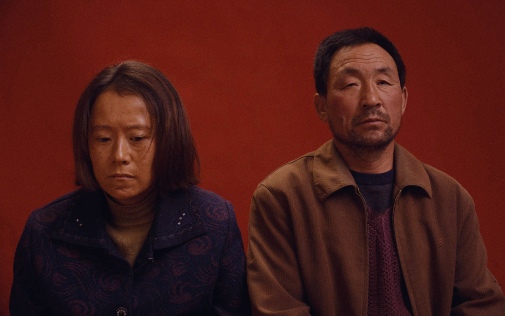Return to Dust: Against Censorship
 Monday, July 24, 2023 at 8:45PM
Monday, July 24, 2023 at 8:45PM 
Barbie this, Oppenheimer that, the Barbenheimer double feature wasn't the only title worth watching to arrive in theaters last week. Indeed, one of 2022's most controversial titles finally enjoyed its American release well over a year after it competed at the Berlinale and incurred the wrath of the Chinese government. Ruijun Li's Return to Dust deserves the attention of every cinephile, both because one shouldn't bow to the pressures of censorship but also because it's a remarkable bit of social realist filmmaking. Its ability to touch on hard truths made it an unlikely box office success before all that attention ruffled some feathers…

Director Ruijun Li's sixth feature returns to his rural hometown of Gaotai, in the Gansu province, where most of his works have been set. The scenery could inspire notions of pastoral idealism if not for the harsh lens with which the film considers its spaces, social and geographic, rendering them in a register between sorrowful poem and documentary-lite exposé. There's no dreamed-up wonder in these images, only an honest narrativization of real life. And yet, one could describe Return to Dust as a love story. An anti-romantic take on the genre, it's nevertheless indebted to the observation of two souls coming together.
They are Ma Youtie and Ca Guiying, two social pariahs whose families arrange matrimony not as a happy union but a deliberate attempt to unburden themselves of responsibility. Played by actress Hai-Qing, Guiying is a particularly unwanted presence, having aged beyond when most local women would marry. However, hers is not simply a matter of lost feminine youth within patriarchy, for she's also plagued by infertility and incontinence, perhaps even undiagnosed mental illness. Marrying her out of the family home is a cruel convenience, and there seems to be little affection between her and Youtie, only resigned pragmatism.
Still, from their cold bond, warmth will emerge, down-to-earth conclusions happening internally while the camera captures melting barriers, the gradual growth of companionship from the harsh terrain of shared lives. Tenderness is a flower that blooms with subtle brightness, expressed in casual gestures and unsolicited kindness – a sentimental odyssey of the domestic stage. Such matters are replicated in spatial rhyme as the couple moves from home to home within their desert realm, selling their houses to be demolished as part of a governmental program. In this, Return to Dust finds its structure, following the leads along their journey for a year, 2011.

Everything is cyclical, from the domestic transitions to the agricultural labor that takes bodies to their limit, blood transfusions to a powerful local businessman, thus portrayed as a vampiric entity purloining the poor man's veins in search of ill-gotten sustenance. Gestures repeat as do movements, but another parallel growth offers counterpoint. It's a house rising from nothing, an abode built by the couple as they cycle through their temporary habitations, a dream of the future manifest in brick and clay. It's a spark of hope that can blind those who look directly at it, a burning promise that keeps Return to Dust from unbearable misery.
Weihua Wang's cinematography also does much to contradict notions of poverty porn, always eager to find painterly qualities in its squalid milieu, to hone on a strong color until it glows on screen. Gold and red above all, but also a hint of blue in shadows, a pearl glisten on perspiring skin, a green brushstroke to make us feel the bounty of farmed earth. The very solidity of their union is a scarlet line, a paper token whose presence turns a house into a home. Barren lives need not be ugly, and such depictions are not necessarily tied to ideas of gross anesthetization. Instead, they are mercies not unlike the tender touch between husband and wife, a comforting compassion that doesn't deny the exercise's frankness nor its rigor.
Moreover, between Hai-Qing and Renlin Wu, Guiying and Youtie emerge as fully realized characters whose integrity shall not lapse into that old archetype of the noble peasant. There's no moral value in suffering, no greatness in allowing an unjust system armed with societal indifference to squash you down. The unwillingness to follow the economic exodus from the country to the city is another show of defiance against industrial directives. And so apolitical readings break apart, give way to a film of galvanizing power – more Renoir than Murnau, somewhat reminiscent of Lou Ye's To Live and no less harrowing.

Perhaps that's why Chinese audiences flocked to it, making Return to Dust the most successful picture in national cinemas across the summer of 2022. However, popularity inspired scrutiny from those who might feel threatened by such cinematic honesty, resulting in calls for an alternative ending. After that came the prohibition of the film's discussion on social media, its pull from cinemas, and, finally, its removal from streaming services. Dissident voices like Ai Wei Wei reflected on the matter, concluding the decision was unsurprising, though the success of such a humble art-house project must hold its modicum of shock.
American audiences now have an opportunity to support this gem and appreciate subtle points that shouldn't feel radical though they were treated as dangerous. It's a work of severe social drama given a kiss of humanism, a breath of poetry that deserves the standing ovations some have tried to deny. To reiterate the point: Watch Return to Dust not only because it's a great film but because one must go against censorship.



Reader Comments (1)
Interesting